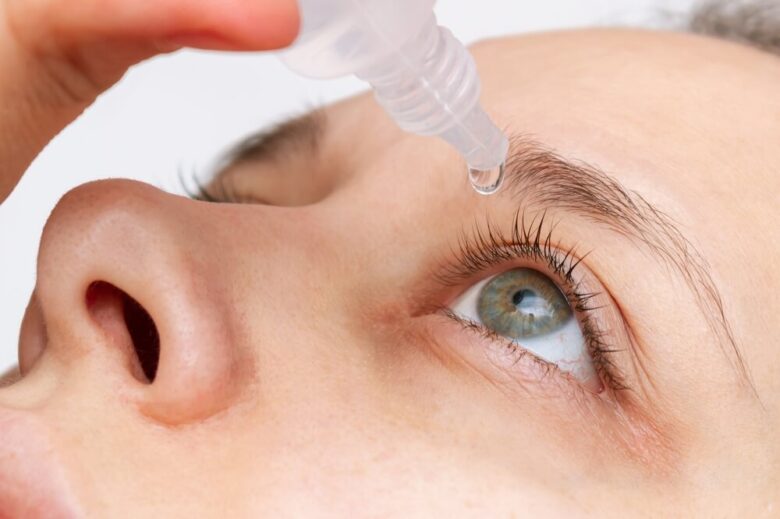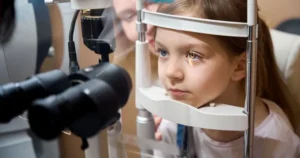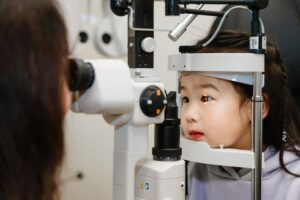People often have dry eyes, which are uncomfortable. They happen when your eyes don’t make enough tears or when the tears dry out too fast. These things might make your skin itch, turn hot, blur your vision, and feel rough or burning. There are over-the-counter drops and prescription medicines that can help with dry eyes, but many people would rather use natural, non-drug ways.
This piece will talk about useful, scientifically proven ways to deal with dry eyes without using medicine, make your eyes feel better, and improve your general eye health.
Why do dry eyes happen?
Several things can cause dry eye syndrome, such as spending too much time in front of a screen, getting older, living in a certain area, wearing contact lenses, or having a health problem that needs to be treated. Changes in hormones, especially in women, and bad habits like smoking or not drinking enough water can also make it worse.
Figuring out the cause of the problem helps you pick the best natural treatments to get rid of it:
1. Close your eyes more often and fully
A lot of people blink less often without realizing it, especially when they’re staring at a screen for a long time. Tears stay in the eye longer when you blink because they are spread out evenly over the surface of the eye. To make the tear sheet more stable:
During screen time, make an effort to blink all the way through.
Do “complete blinks” by closing your eyes slowly and stopping for a moment before opening them again.
2. Stick to the 20-20-20 rule
This easy movement can help your eyes feel better when they’re tired and dry. Every 20 minutes, look at something 20 feet away for at least two minutes. It helps your eyes clear and focus, and it makes you blink more.
3. Drink water
Dehydration can make it harder to make tears. Making sure you drink enough water throughout the day can help keep your tears in good shape. Aim to drink 6–8 glasses of water every day, and cut back on booze and coffee, which can make you dehydrated.
4. Put on a warm pack
Putting a warm, wet towel on your closed eyelids can help open up meibomian glands that are clogged. These glands make the sticky layer of your tears. This keeps tears from evaporating and calms eyes that are red and itchy. Every day or twice, soak a clean sponge in warm water for five to ten minutes.
5. Change the place where you are
It can get worse if the air is dry. Make changes to your environment to reduce triggers:
- Add wetness to the air inside with a humidifier.
- Stay away from fans, heaters, and air units that are right next to you.
- Outside, wear shades with a full rim to protect your eyes from wind and dust.
6. Eat foods that are high in omega-3s
Essential fatty acids, especially omega-3s, help keep the eyes moist. Salmon, chia seeds, flaxseeds, walnuts, and sardines are some foods that can help your tears work better. If you don’t get enough Omega-3s from your food, talk to your doctor about taking a natural supplement.
7. Clean your lashes and eyelids
Keeping your eyelids clean can help you deal with dry eyes, especially if they are caused by blepharitis. Once a day, gently clean your eyes and lash line with baby shampoo that has been reduced or an eyelash cleaner that you can buy. This keeps the oil glands working right and stops congestion.
8. Cut down on screen time when you can
When you spend a lot of time in front of a screen, you blink less, which is a big cause of evaporative dry eye. To ease the pressure, take breaks often, change the brightness of your screen, and think about using a blue light filter or night mode.
FAQ
Does dry eyes go away by themselves?
Mild cases of dry eye may go away with easy changes to your lifestyle, especially if they are caused by short-term things like wind or screen time. Chronic dry eye, on the other hand, usually needs ongoing care.
Are there any risks when using warm packs?
Warm compresses are safe as long as they are done correctly with a clean, warm (not hot) cloth. To keep from getting an illness, never use hot water on the bandage and keep it clean.
Can some vitamins help eyes that are dry?
Yes. Vitamins A and D and omega-3 fatty acids help the eyes make tears and keep the skin of the eyes healthy. It may be beneficial for you to eat a lot of fresh veggies, oily fish, and colored foods.
Do dry eyes and eye allergies mean the same thing?
Not at all. Even though signs like redness or discomfort may be similar, allergies are caused by the immune system reacting to allergens, while dry eyes are caused by not making enough or the right kind of tears.
In conclusion
A few constant changes to your lifestyle can help you deal with dry eyes naturally. A few simple things can make a big difference, like blinking more, drinking water, eating foods that are good for your eyes, and taking care of the surroundings. These methods not only ease symptoms but also help keep your eyes healthy in the long run, and they don’t require any medicine.
If your symptoms don’t go away or get worse, you should see an eye doctor right away to rule out any underlying problems and look into other treatment choices.




